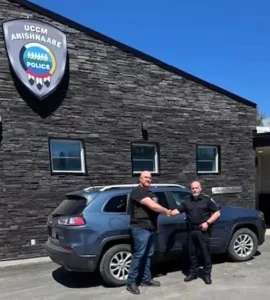UCCM Police donates new vehicle to strengthen rapid mental health care and emergency support across Manitoulin Island

By Rick Garrick
MANITOULIN ISLAND — The Health Sciences North (HSN)’s Mobile Crisis Rapid Response Team (MCRRT) is looking forward to providing enhanced emergency mental health services after the United Chiefs & Councils of Manitoulin Anishnaabe Police Service (UCCM Police) donated a dedicated crisis vehicle. The MCRRT is a collaborative initiative between HSN, Ontario Provincial Police (OPP), and UCCM Police that pairs police officers with mental health crisis workers to provide immediate, on-site support to individuals experiencing a mental health crisis.
“It is a standard civilian vehicle but it is specifically for myself and my work partner to use to assist in the work we do with UCCM Police and the Ontario Provincial Police,” says Pete VanVolkingburgh, mobile crisis worker at HSN, noting that the incidents they attend are often time quite a distance away from each other. “This allows my partner and I to be able to attend the location of the police officers whenever they require us on scene to assist with a call and be able to get there in a manner not requiring police officers to divert from the call to come pick us up or reroute their day. We are able to actually get there fairly seamlessly now because we have a vehicle and are able to actually attend when officers need us.”
The MCRRT responded to 884 calls for service in 2024, with a focus on de-escalation, crisis management, and connecting individuals to long-term community supports.
“We are mobile — our home base is in Little Current because we have the space there, but we spend our time on the road split between the Ontario Provincial Police office, the UCCM office in M’Chigeeng, and the two local hospitals because we provide crisis coverage to those hospitals as well,” VanVolkingburgh says.
VanVolkingburgh says the dedicated crisis vehicle is a 2022 Jeep Grand Cherokee that is outfitted with everything they could possibly need.
“We’re able to actually keep it outfitted with some of the supplies and the gear we like to keep on us, anything from basic gloves and extra Narcan and those types of things,” VanVolkingburgh says. “We’re even able to keep some of our referral papers and paperwork in there, so we are able to be very flexible in the way that we respond and have our equipment with us.”
UCCM Police Chief James Killeen says the MCRRT workers are now able to provide assistance quicker than before after the dedicated crisis vehicle went into operation in April, noting that the UCCM Police covers a very large geographic area with six communities located across Manitoulin Island and along Hwy. 6.
“The whole point of the program is to be able to respond to people in a timely fashion and to be able to roll out that crisis intervention and get them the help they need quicker, so it makes sense for them to be able to have their own vehicle and get to those people that need it a lot quicker,” Killeen says. “We’ve noticed immediately that they are able to immediately respond to any calls that we have.”
Killeen says the vehicle they donated for the dedicated crisis vehicle was in pretty good shape, with only minimal maintenance required to be ready for use.
“We looked at it and said, ‘Why not donate that to our MCRRT workers, which we have seen [are providing] a tremendous assistance with our crisis calls,’” Killeen says. “Our donation reflects our deep commitment to ensuring the safety and well-being of our communities. We are proud to work hand-in-hand with Health Sciences North and our partners to provide care that meets people where they are, with the dignity and support they deserve.”


